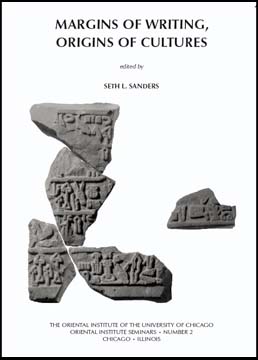OIS 2. Margins of Writing, Origins of Cultures
 Seth L. Sanders, ed., with contributions by Seth L. Sanders, John Kelly, Gonzalo Rubio, Jacco Dieleman, Jerrold Cooper, Christopher Woods, Annick Payne, William Schniedewind, Michael Silverstein-, Piotr Michalowski, Paul-Alain Beaulieu, Theo van den Hout, Paul Zimansky, Sheldon Pollock, and Peter Machinist
Seth L. Sanders, ed., with contributions by Seth L. Sanders, John Kelly, Gonzalo Rubio, Jacco Dieleman, Jerrold Cooper, Christopher Woods, Annick Payne, William Schniedewind, Michael Silverstein-, Piotr Michalowski, Paul-Alain Beaulieu, Theo van den Hout, Paul Zimansky, Sheldon Pollock, and Peter Machinist
- Download second printing, 2007
- Download original publication, 2006
- Terms of Use
Writing and the state both first began in the ancient Near East. The origins of history are traced to the place where they met. But what did they actually have to do with each other? Most of ancient Near Eastern philology consists of careful examination of the leavings of the state scribes; it has revealed a treasure-house of ancient culture, from haunting poetry to onion archives. But there is a crucial blind spot in our perspective on the largest and oldest archive of the ancient world: the relationship between the vast body of official writing and the actual life of language as spoken, understood, and imagined by ancient Near Eastern people. The vital relationships between language and ethnicity, the connections between languages of empire and local identity, and way languages are born, live and die in writing has remained the subject of more speculation than rigorous research. If recorded history began in the ancient Near East, we are just beginning to explore the powerful creative relationship between writing and the political identities of the Near East’s cultures. Collectively, the articles here provide well-documented challenges to conventional wisdom about that for which people actually used Sumerian, Egyptian, Hittite, and Hebrew. This conference was the first to bring leading philologists together with anthropologists and social theorists to explore what writing meant to politics in the ancient Near East. The conference was designed to encourage philologists to talk to theorists about how their material matters. It seems to have worked. The papers and responses give a vivid sense of the stakes and consequences of the oldest written texts in the twenty-first century. We met over two days, on February 25-26, 2005, at the University of Chicago Oriental Institute’s James Breasted Auditorium. Fourteen participants attended; Piotr Michalowski, our fifteenth, was out of the country on an international research project.
- Oriental Institute Seminars 2
- Chicago: The Oriental Institute, 2006 (second printing, 2007)
- ISBN: 1-885923-39-2
- Pp. x + 306; 9 figures
- Softcover, 7 × 10 in
- $24.95

